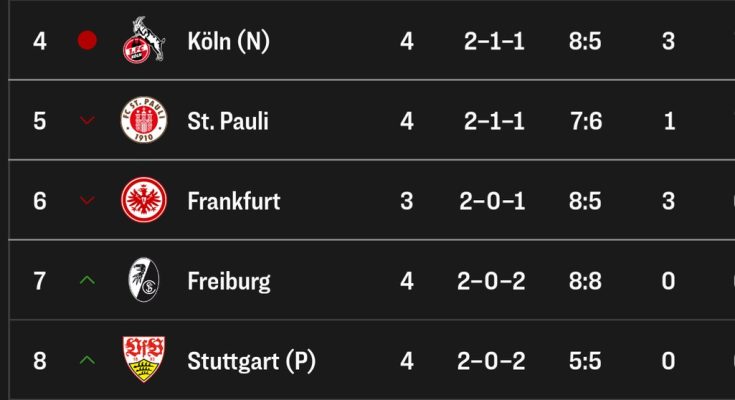The Bundesliga has rolled through four matchdays, and for many fans, the same old narrative is already weighing heavy on the season. The league, always rich in drama and stories around its iconic clubs and passionate supporters, still finds itself battling against the inevitable feeling that Bayern Munich will once again be crowned champions come May. It is almost as if the competition for the Meisterschale has already been decided long before the winter break. While Bayern’s dominance is nothing new, it casts a long shadow over what otherwise could be a thrilling and unpredictable competition. For those outside Bavaria, the cycle feels like a repetitive film played season after season. The reigning champions sweep aside challengers, their machine-like consistency dwarfs the flashes of brilliance from others, and the result is a league that often has more excitement at the bottom than at the top.
And indeed, that seems to be the case again this year. After just four games, Bayern’s sharpness, efficiency, and depth are on full display. Even when they are not at their very best, their sheer quality usually delivers three points. This isn’t just about having a squad stacked with world-class talent; it’s about a winning culture that has been drilled into the club for decades. Rivals know they can beat Bayern on a given day, but to do so consistently across a season requires near perfection. That has not been delivered by anyone since Borussia Dortmund’s back-to-back triumphs under Jürgen Klopp over a decade ago. The predictable air around the title chase leads many fans to shrug off the season’s early developments with a kind of weary acceptance. You don’t need to be a prophet to guess that Bayern will finish top—so why bother pretending there’s a real race at the top?
Instead, the Bundesliga’s real theater emerges elsewhere: the chaos of the relegation battle. It is here that desperation, passion, and fear combine into raw drama week after week. While the cameras often shine brightest on the giants of Munich or Dortmund, the true survival fights unfold in stadiums where every point is life or death for clubs battling to avoid the drop. Already, after just a few rounds, there are clear warning signs about which teams are staring at a long, hard season. And among them, St. Pauli’s situation looks particularly grim.
For many, St. Pauli’s presence in the Bundesliga was supposed to be a breath of fresh air. The cult club from Hamburg, famous for its alternative culture, politically charged fan base, and unique identity, finally clawed their way back to the top flight after years in the second division wilderness. Their return was greeted with joy not only from their loyal supporters but also from neutrals who appreciate what Pauli stands for in a footballing landscape often dominated by commercial powerhouses. Yet the romanticism of their promotion quickly collides with the harsh reality of life in the Bundesliga. Unlike Bayern or Dortmund, St. Pauli does not have the luxury of deep pockets or a squad brimming with internationals. Survival was always going to be the goal, and so far, the early signs suggest that goal is slipping away faster than expected.
Four games in, Pauli already look adrift. The gap in quality between them and most opponents is glaring, and the adjustments needed to cope with the pace, physicality, and tactical demands of the top tier have not been smooth. Their attacking play often looks toothless, their defense brittle under pressure, and their midfield struggles to impose itself. In matches where other newly promoted teams have managed to dig out a result through grit and determination, Pauli have faltered. What hurts most for their fans is that it isn’t just about results—it’s about the performances. Too often, they have looked like a side simply not built for this level.
There is, of course, always hope in football. Seasons are long, and form can change. Teams in crisis can rally around key moments: a scrappy win, a late equalizer, a heroic defensive display. For Pauli, those moments have yet to arrive, and unless they do soon, the narrative could spiral. The Bundesliga is unforgiving. A few losses become a habit, and before long, a team finds itself trapped in a cycle of pressure and panic. Already, their fans are asking tough questions about whether the club did enough in the summer to reinforce the squad, and whether the coaching staff have a clear plan to make the step up.
Yet it would be unfair to place all focus on Pauli alone. The relegation battle, as always, involves multiple clubs. Some teams enter the season with fragile foundations, and others collapse unexpectedly when injuries or internal issues strike. Traditional yo-yo clubs, those that bounce between the Bundesliga and the 2. Bundesliga, know this grind all too well. The margins are fine, and a single victory or loss can alter the mood drastically. For neutrals, this is where the Bundesliga truly entertains. Unlike the top, where Bayern’s march seems inevitable, the bottom offers raw unpredictability. Who will fight, who will collapse, and who will spring a surprise run of form? Every weekend becomes a nail-biter for the fans of these clubs, where survival means just as much, if not more, than chasing Europe.
It is also in these struggles that you see the human side of the game. Players who may never win trophies still carve out careers defined by heroic moments in relegation battles. Coaches risk their reputations on bold tactical gambits to save their clubs. Fans, often from smaller cities with fewer resources, live every kick with a passion that rivals any title celebration. To them, avoiding relegation is not just about football—it’s about pride, identity, and community. St. Pauli’s supporters, known for their loyalty and activism, will surely stand by their team no matter what happens. But even the most devoted fan base cannot change the fact that their team looks lost after four games.
The wider Bundesliga story is thus one of contrasts. At the top, monotony. Bayern reign supreme, and unless an extraordinary collapse or miracle happens, they will do so again. Their rivals may steal headlines with occasional victories, but over 34 matchdays, the Bavarians’ relentlessness crushes hope. At the bottom, chaos. Here, everything is uncertain, and every point carries massive weight. It is a paradox that while the title race is often dismissed as boring, the relegation fight consistently delivers the most compelling drama. This dual reality shapes how fans engage with the league. For Bayern supporters, dominance is sweet. For others, the thrill lies not in who wins the league, but in who manages to stay in it.
Of course, one can imagine counterarguments. Some will say that calling the title race over after just four games is premature. Football is full of surprises, and shocks do happen. Injuries, slumps, and unexpected challengers can alter the script. Borussia Dortmund, RB Leipzig, or Bayer Leverkusen might yet string together a run to at least keep Bayern honest. But history makes skeptics of us all. For over a decade, those hopes have been dashed year after year, leaving only Bayern at the summit. Until someone actually dethrones them, the belief that they will inevitably win again is hard to shake.
Meanwhile, for St. Pauli and others staring at the bottom, the fight is just beginning. Seasons are not decided after four games, no matter how bleak the start. There is time to regroup, to learn, to strengthen in the winter window. Survival is not about starting well but about finishing with enough points to stay above water. St. Pauli may look lost now, but football has a way of producing redemption arcs when least expected. Their fans will cling to that hope, and their players must find it within themselves to fight for every ball, every point, and every chance.
The Bundesliga, then, remains a league of two faces. To dismiss it entirely as boring because of Bayern’s dominance is to ignore the sheer intensity of what happens below them. For those who view football as more than just about who wins the biggest prize, the relegation scrap is every bit as enthralling as a title chase. And right now, after just four rounds, that scrap already looks like the true story of the season. St. Pauli’s struggles are only one chapter in what will surely become a rollercoaster narrative of survival, despair, and maybe even unexpected joy.
So while many will yawn and roll their eyes at the thought of yet another Bayern title, they should not turn away from the league entirely. There is still plenty to watch, to feel, and to care about. The Bundesliga delivers drama not because of the fight at the top but because of the fight at the bottom. And if St. Pauli truly are lost, as it appears now, then their journey back to hope—or their collapse into despair—will be one of the defining stories of this campaign.


